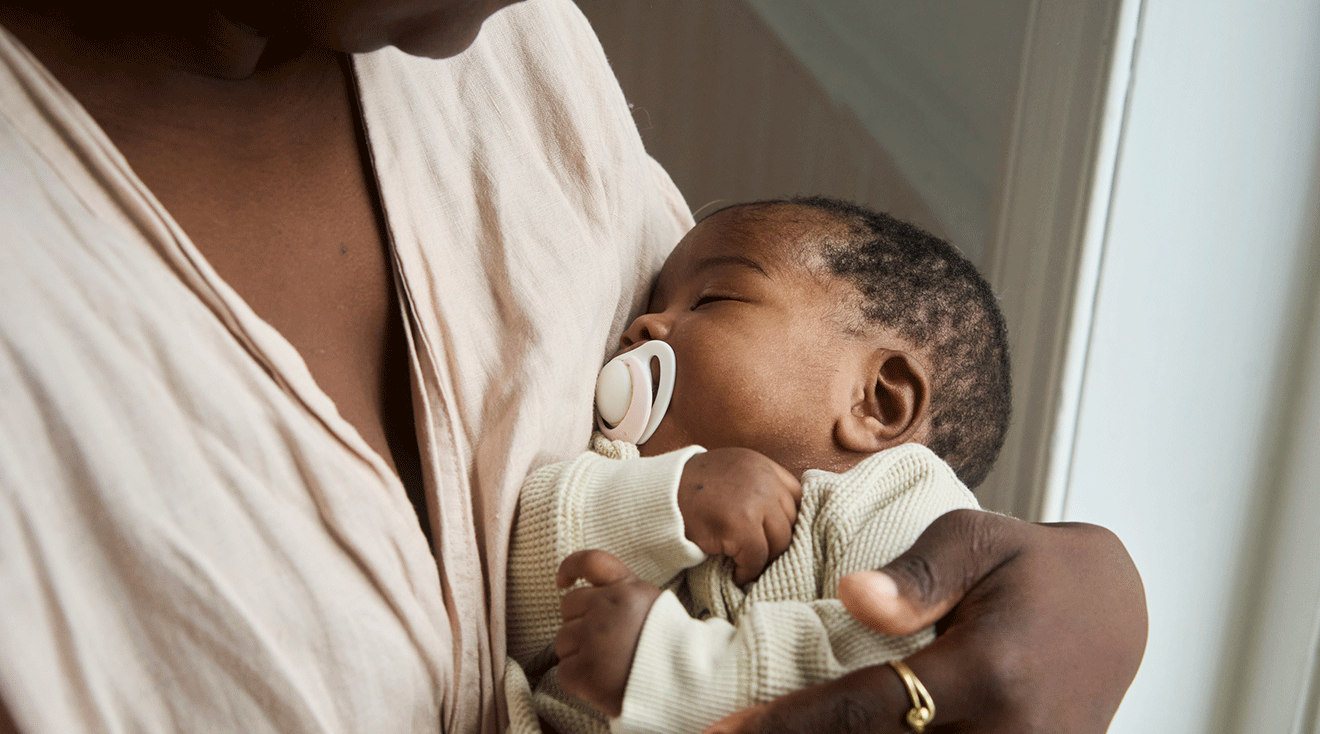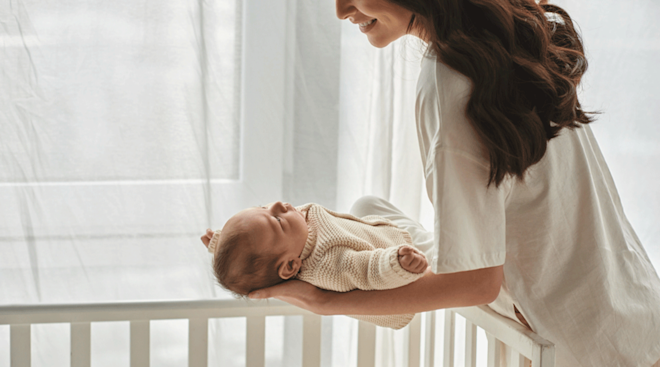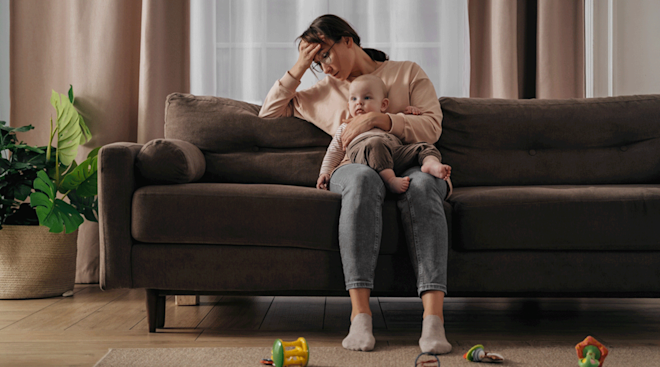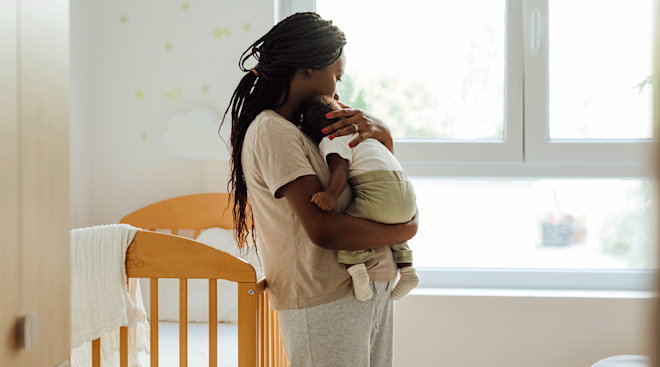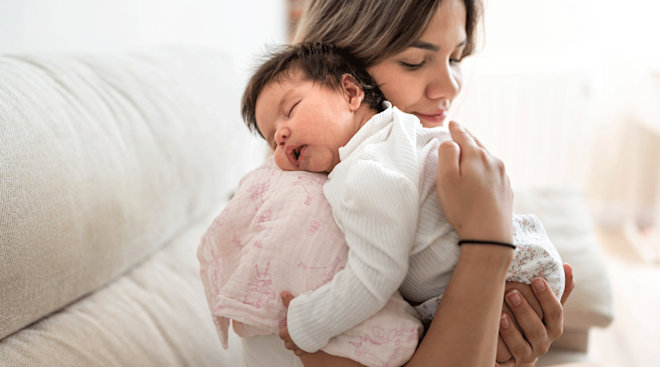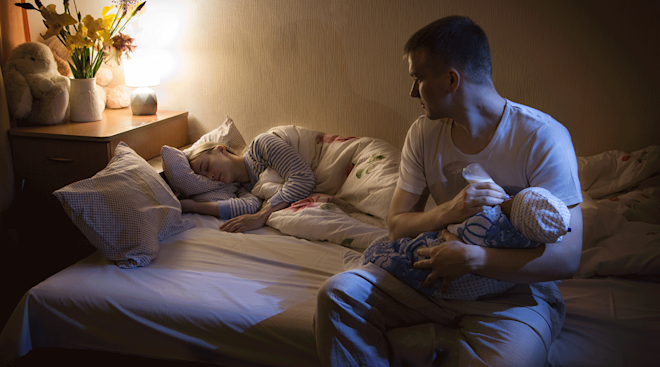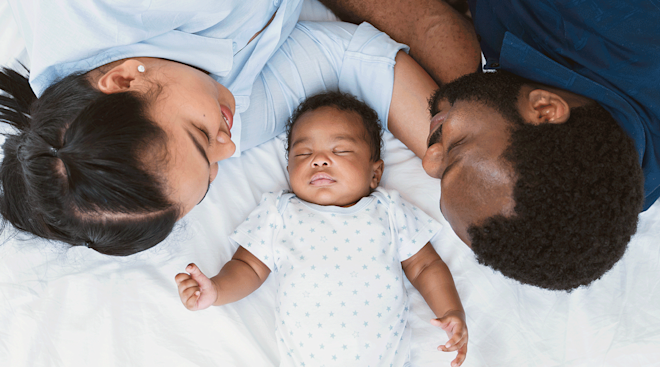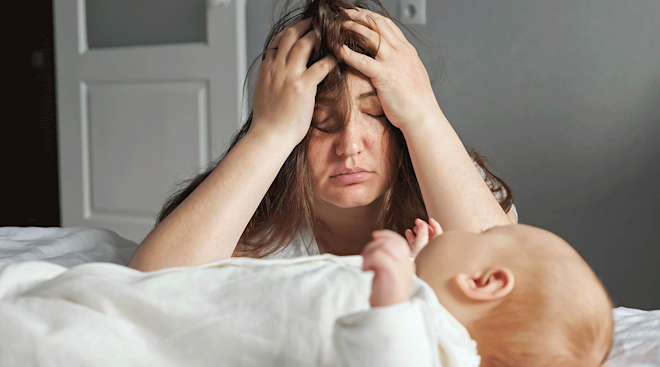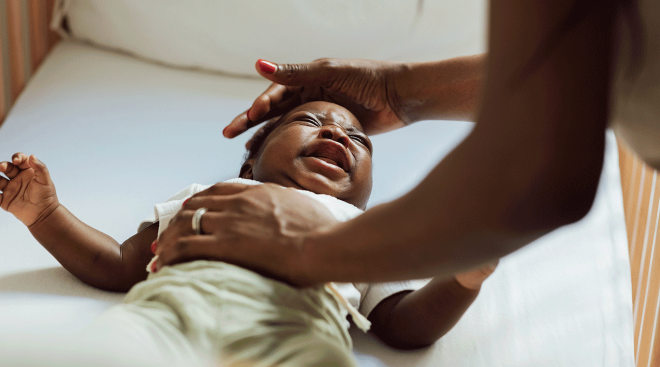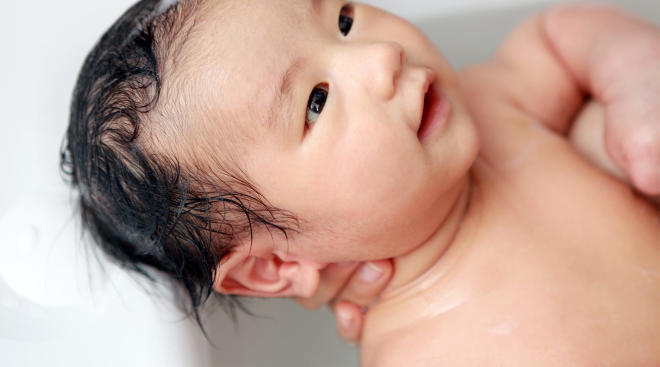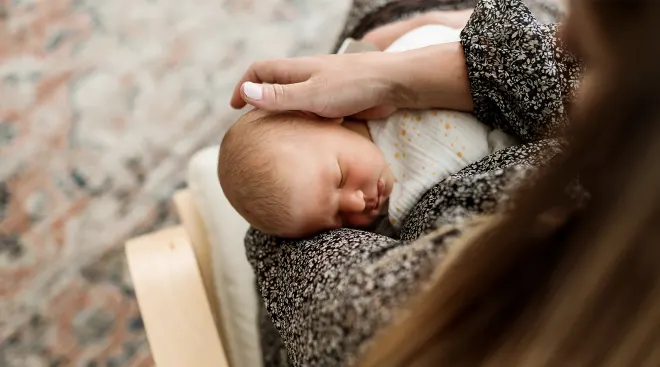Can a Newborn Sleep Too Much? Here’s What to Know
Your sleep-deprived parent friends might think you’re crazy for worrying about baby oversleeping, but it’s common to be surprised by just how much newborn babies snooze. Yes, newborns sleep a lot—but can a newborn sleep too* much? Here’s the deal: It’s totally normal for a newborn to sleep a lot. After all, growing is tiring work! But sometimes all that napping can get in the way of baby’s healthy growth. Read on to learn from experts how much newborns need to sleep, and when you may need to wake baby for a feeding.
Why do newborns sleep so much? The main reason is the drastic physical and mental development babies experience in those first few months, says Rachel Mitchell, a maternity and pediatric sleep specialist. “Especially in the first year of life, babies are developing rapidly (more than in any other stage) and need adequate sleep to ensure they can reach important milestones.”
Additionally, babies sleep differently than we do. “Their sleep architecture—that is, the parts of their sleep that are REM and non-REM sleep—is quite different from that of adults,” explains Elizabeth Cilenti, MD, MPH, a pediatrician with Northern Virginia Family Practice. Newborns spend around 50 percent of their sleep in REM sleep—as babies grow, they begin to spend less time in REM-sleep and more time in non-REM sleep, similar to adults. However, while newborns sleep only for a short stretch at a time—one to three hours—their need for REM sleep requires them to sleep for a longer amount of time within a 24-hour period.
Moreover, babies aren’t born with a developed circadian rhythm—so they can’t differentiate day from night—and newborns don’t produce melatonin, the hormone that promotes sleep, Mitchell notes. In other words, newborns don’t yet know when it’s time to sleep and when it’s time to wake. (Rest assured, this is normal and will resolve in time, she adds.)
How much do newborns sleep? “Interestingly, there isn’t as much expert consensus on how much sleep very young infants under 4 months need,” Cilenti says. That said, Mitchell notes that generally newborns sleep between 15 and 17 hours a day. Infants ranging from 4 to 12 months generally sleep between 12 to 16 hours daily, both experts note. However, keep in mind that this range may be different for your child, depending on their personal growth, activity level and sleep needs.
When baby spends most of their day asleep, it’s natural to wonder if they’re sleeping too much. While it isn’t common, some babies may sleep more than they need to, which can interfere with the awake time and stimulation they need for growth, Mitchell says. Ultimately, though, there’s a lot of variation in how long baby needs to sleep—and “generally babies aren’t going to sleep more than what they need to in a 24 hour period,” she adds.
That said, while most babies aren’t sleeping too much overall, they may be sleeping too much at night or during the day, making it harder for them to stay asleep at night, or take naps during the day.
It’s also possible for babies to sleep too much if they’re missing feedings—the issue isn’t logging too many hours of shut-eye, rather it’s about how much food baby’s getting. “Sometimes in the first month, babies can be too sleepy,” says Daniel S. Ganjian, MD, a pediatrician at Providence Saint John’s Health Center in Santa Monica, California. It’s important to make sure they’re feeding well, regardless of how much they’re sleeping: For breastfed babies, that means feeding eight to 12 times a day; for bottle-fed newborns or older infants, that’s five to eight times a day. “Most babies will wake up every two to three hours asking to feed, particularly during the newborn period,” Cilenti adds. “If they don’t, it could be a sign that something is amiss.” (More on this below.)
While sleep is a natural part of baby’s overall development, there are a few reasons baby could be sleeping more than usual, including:
- Illness: This is more of a sign for older babies, who generally have better established feeding patterns, Cilenti explains. The illness could be something minor like a cough or cold, or something more serious like jaundice, which causes lethargy. “Sometimes babies who are recovering from an illness will sleep longer than their usual sleep duration,” she says.
- Change in routine: This could include coming home after a family vacation or sleeping in a new place while visiting family, Cilenti notes. New environments could cause baby to sleep less—meaning they’ll sleep more to make up for it once they’re home and back in their normal routine.
- Growth spurts: Mitchell cites hitting milestones and growth spurts as additional reasons baby may sleep more than usual.
“These are all situations in which you might see a sudden increase in day and/or night sleep, but it’s usually temporary as babies adjust back to their normal routine,” Mitchell says.
Ultimately, it’s best to confer with your pediatrician about baby’s specific feeding and sleeping needs. However, for newborns, all experts say, in general, they should feed every two to three hours. “Most babies will wake up around that interval ready to feed, but if it has been longer than what your pediatrician recommends, it’s usually best to wake baby,” Cilenti says. This is especially true for babies born prematurely or with cardiac issues and other medical conditions, adds Peter Greenspan, MD, vice chair of the department of pediatrics at Massachusetts General Hospital in Boston.
Once baby is past the four- to six-week mark and gaining weight normally, you may be able to stop waking them to feed at night, Mitchell adds. In fact, according to the American Academy of Pediatrics (AAP), most healthy babies don’t need to be roused for feedings. Your pediatrician will measure baby’s weight at each visit to see how baby’s growth is charting. “If we see that baby is getting enough calories, that shows us they’re able to drink well and don’t need to be woken up for feedings,” Ganjian says. But it’ll take a few weeks after birth before the doctor has enough growth data to make that determination. Until then, Ganjian says, it’s best to ensure your newborn is feeding every two to three hours. Plus, if you ever have a gut feeling that you should wake baby to feed them, go ahead and do it, adds Diana West, IBCLC, a lactation consultant with La Leche League International.
You’ll also want to wake up older babies to feed if they’re sick, Mitchell adds, to ensure they’re staying hydrated and getting their needed calories.
If you’ve got a sleepy newborn, but they’re otherwise perfectly healthy, celebrate the fact that you have a good sleeper on your hands! But when you need to rouse your little snoozer for a feeding and are running into trouble, you might have to use a few tactics to help stimulate them—gently. “When waking baby to feed, it’s important to do so gently so you don’t startle them awake,” Mitchell says. Here, a few tips from the experts on how to wake baby for feedings:
- Place baby on a firmer surface. Putting baby someplace where they may feel a little vulnerable (like on a floor play mat) can help rouse them, says Leigh Anne O’Connor, IBCLC, a lactation consultant and La Leche League leader.
- Unswaddle baby. Sometimes it just takes a little less coziness to get baby to wake up, Mitchell says. Take off their swaddle blanket and undress them a bit, and they just might feel cool enough to open their eyes.
- Change baby’s diaper. A little freshening up (and a wet wipe on their bum) can help wake baby. Or, try a gentle sponge bath with a warm, wet washcloth to get baby to perk up, O’Connor says.
- Stroke baby’s back: Running your fingers up and down baby’s spine can help keep them awake to feed, Ganjian says. You might also try gently tickling their hands and feet, or very gently blowing on their face—sure, baby might give you a weird look, but this move can help wake them up enough to eat, he adds.
- Increase the light: Slowly increasing how much light baby is exposed to can help rouse them, Cilenti says. You might also try turning down their sound machine, or softly speaking and singing to baby to wake them, Mitchell adds.
- Bring the nipple to their mouth: Whether it’s a breast or a bottle, touch the nipple to baby’s mouth to see if they start to suck naturally, Mitchell says.
If you have a sleepy baby, you may be wondering when to worry. Normally, a sleepy newborn is nothing to worry about. However, there are a few indicators that mean something else could be at play and it’s time to reach out to your pediatrician. Cilenti and Mitchell cite these as:
- Baby sleeping well above their recommended amount
- Baby’s sleepier than normal or difficult to wake
- Baby not waking up to feed as you would normally expect
- Baby falling asleep during a feed and not completing a usual feeding
- Baby not being more alert as they get older
- Baby is sick and has a fever of 100.4 or above rectally
If you otherwise have a feeling something’s not right, don’t hesitate to reach out. “It’s always reasonable to check in with your pediatrician if you’re worried about your baby,” Cilenti says.
Frequently Asked Questions
Is it normal for a newborn to sleep all day?
If your newborn sleeps all day, it’s usually nothing to worry about. As mentioned, babies that young don’t have a concept of day versus night. “It is common for newborns to sleep a lot, sometimes up to 18 hours per day, and they may not necessarily schedule that time when the parents would prefer to be asleep,” Cilenti says. Some babies may sleep more during the day and wake more at night—it depends on each baby.
Should I let baby sleep all day or wake them?
If your little one has a knack for sleeping all day, it’s probably best to try to stimulate them enough to rouse them and keep them awake. “Even in the newborn stage it is not a good idea to let babies sleep all day,” Mitchell says. “In order to support healthy sleep patterns it’s important to make sure that sleep is being distributed properly throughout the day and night—and that babies aren't crashing during the day and then staying up all night.” Do this with brighter lights, more noise and talking during the day. You’ll also want to build a dark, soothing and quiet environment at night to help promote sleep.
What happens if baby gets too much sleep?
As noted, babies are pretty good about getting the right amount of sleep necessary for their development. However, if they sleep too much, they may miss a necessary feeding, be more awake at select hours (like the middle of the night) or be working through a growth spurt or illness.
When do newborns stop sleeping so much?
Babies usually start to follow a sleep schedule similar to adults sometime between 3 months and one year, Cilenti says. “Unfortunately, that's a pretty broad range for most parents who are in the thick of the newborn sleep deprivation phase. But usually, by 4 to 6 months, babies are sleeping on average 13 or 14 hours a day over larger blocks of time that are usually a little more predictable.”
When it comes to sleepy newborns and babies, it can be difficult to differentiate between what’s normal and what’s not. Rest assured that as long as baby’s gaining weight and otherwise healthy, the prospect of them sleeping too much isn’t a big concern. That said, never hesitate to contact your pediatrician about baby’s sleep habits and schedule.
Please note: The Bump and the materials and information it contains are not intended to, and do not constitute, medical or other health advice or diagnosis and should not be used as such. You should always consult with a qualified physician or health professional about your specific circumstances.
Plus, more from The Bump:
Elizabeth Cilenti, MD, MPH, is a pediatrician with Northern Virginia Family Practice. She completed her medical degree and residency at Indiana University School of Medicine and her master’s degree in public health at the Harvard T.H. Chan School of Public Health.
Daniel Ganjian, MD, FAAP, is a pediatrician at Providence Saint John’s Health Center in Santa Monica, California. He has a special interest in fighting childhood obesity with his pediatric expertise and as a certified personal trainer. He received his medical degree from the University of California, Irvine.
**[Peter Greenspan](https://www.massgeneral.org/children/doctors/16542/peter-greenspan**, MD, is the vice chair of the department of pediatrics at Massachusetts General Hospital in Boston. He earned his medical degree from Boston University and completed his residency at Massachusetts General Hospital.
Rachel Mitchell is a certified maternity and pediatric sleep specialist, founder of My Sweet Sleeper and mom of seven. She has been working with families all over the world for nearly 10 years, helping them implement practical tips and approaches with their children to help them get better sleep. She earned her maternity and infant sleep certification from International Maternity Institute in 2013.
Leigh Anne O’Connor, IBCLC, LCCE, is a board-certified lactation consultant based in New York City with over 20 years of experience. She has served on the Board of the New York Lactation Consultant Association and has been an accredited La Leche League Leader for over two decades. O’Connor is also a Lamaze Certified Childbirth Educator.
Diana West, IBCLC, is a lactation consultant with La Leche League International and co-author of several books on breastfeeding. She has previously served as the director of professional development on the Board of the International Lactation Consultant Association.
Healthy Children (American Academy of Pediatrics), Sleeping Through the Night, September 2013
Learn how we ensure the accuracy of our content through our editorial and medical review process.
Navigate forward to interact with the calendar and select a date. Press the question mark key to get the keyboard shortcuts for changing dates.
































